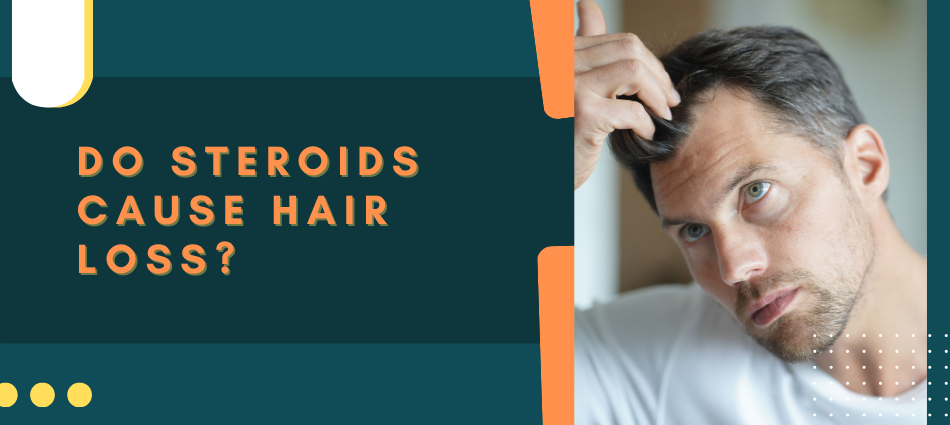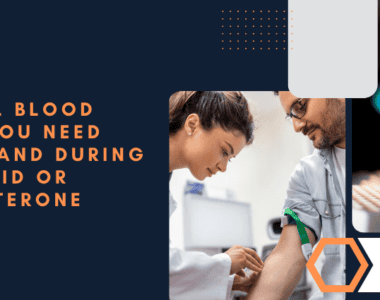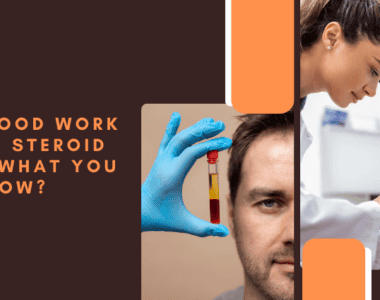Do steroids cause hair loss?
Steroids can cause hair loss, especially by raising DHT (dihydrotestosterone). DHT is a hormone that decreases hair follicles and causes male or female pattern baldness. This impact is more common in people who have a genetic susceptibility to hair loss.
When most people think of steroids, they envision anabolic steroids used to increase muscular mass. However, the type of steroids used and their administration method determine the risk of hair loss. Using steroids without medical supervision increases the risk of negative effects, such as hair loss.
How Do Steroids Cause Hair Loss?
Hormonal fluctuations contribute to hair loss, particularly male pattern baldness. Dihydrotestosterone (DHT), a hormone that can damage hair follicles, plays an important role in this process. Steroids, especially anabolic steroids, may increase DHT levels in the body, causing severe hair loss and baldness in people susceptible to the condition.
The Role of DHT in Hair Loss
5-alpha reductase, an enzyme, converts testosterone to DHT. While DHT is essential for male sexual development, it has an adverse effect on hair follicles. It interacts with receptors in scalp follicles, resulting in irritation and innovative shrinking. This causes shorter hair growth cycles, and finally, the hair stops growing completely.
Genetic Factors and Sensitivity
Not everyone who uses steroids experiences hair loss. This is because genetics play a big role. Some individuals have hair follicles that are naturally resistant to DHT. However, for people genetically predisposed to androgenic alopecia (male or female pattern baldness), elevated DHT levels caused by steroids can trigger or worsen hair loss.
Anabolic Steroids and Hair Loss
Anabolic steroids are synthetic compounds similar to testosterone. These steroids can significantly increase DHT production, which accelerates hair follicle damage. For men already at risk of balding, this makes steroid use a major contributing factor to hair loss.
Managing Steroid-Related Hair Loss
If hair loss occurs, some treatments may help slow the process. Medications like Finasteride can block the production of DHT, reducing its effect on hair follicles. Additionally, consulting a healthcare professional before using steroids can help manage risks, ensuring the benefits outweigh potential side effects.
Which Steroids Cause Hair Loss?
If you are genetically prone to male pattern baldness, you should avoid the following steroids:
On this list, all but DianabolTM and Trenbolone are DHT-based steroids. In some cases, testosterone shots and other supplements can also lead to hair loss.
How to reduce steroid-related hair loss?
- Follow your doctor’s instructions when using prescribed steroids and report any side effects, including hair loss.
- Consult your doctor if hair loss occurs; they may adjust your dosage or prescribe additional treatments.
- Maintain a healthy lifestyle by eating a balanced diet, keeping your scalp clean, and managing stress levels to support hair health.
- Avoid using non-prescribed steroids, as misuse can lead to severe side effects, such as increased hair loss, infertility, acne, and other health problems in men and women.
- Seek advice from a dermatologist if you are worried about hair loss. They can recommend treatments or medications to slow hair loss and protect your hair.
- Understand that natural hair regrowth may not always be possible, but early care and proper intervention can minimize the effects of steroid-related hair loss.
Treatments for Hair Loss from Steroid Use
If steroids have already caused noticeable hair loss, stopping their use is the first step. If damage has already occurred, several ways exist to restore your hair and confidence. These options include:
- Lateral slit method
- Stick-and-place method
- Follicular unit extraction (FUE)
- Preparing follicular units
- Donor strip harvesting
- Large-scale sessions
These treatments aim to bring back a fuller, natural-looking head of hair.
What should I do if I experience hair loss while on steroids?
If you’re experiencing hair loss from steroids, here are some steps you can take:
- Talk to a Doctor
Consult a dermatologist or healthcare provider. They can check your condition and suggest the best solutions. - Consider Stopping Steroids
If possible, stop using steroids. This may help balance your hormones and slow down hair loss. - Look Into Hair Loss Treatments
Explore options like medications to block DHT or advanced procedures like hair transplantation if needed.
Taking action early can help manage the problem effectively.
Conclusion
In conclusion, individuals genetically predisposed to baldness may experience hair loss due to steroids. Some steroids produce an increase in DHT levels, which can lead to damaged hair follicles and thinning hair. However, early intervention, such as visiting a doctor, stopping steroid use, and investigating treatments like DHT blockers or hair regeneration techniques, can resolve this problem. Maintaining a healthy lifestyle and obtaining professional advice are crucial for limiting the effects of steroid-related hair loss. With proper care, you can safeguard your hair and general health.
FAQs
Can hair grow back after steroids?
If the follicles do not sustain permanent damage, hair may regenerate after stopping steroids. Early treatment and proper care can improve the chances of regrowth.
Can testosterone cause hair loss?
Yes, testosterone can cause hair loss when it converts to DHT. DHT can shrink hair follicles, leading to male or female pattern baldness, especially in those genetically prone.
What are the causes of hair fall?
Hormonal changes, stress, genetics, poor nutrition, medical conditions, or certain medications, including steroids, can cause hair fall. Environmental factors and scalp health also play a role.




